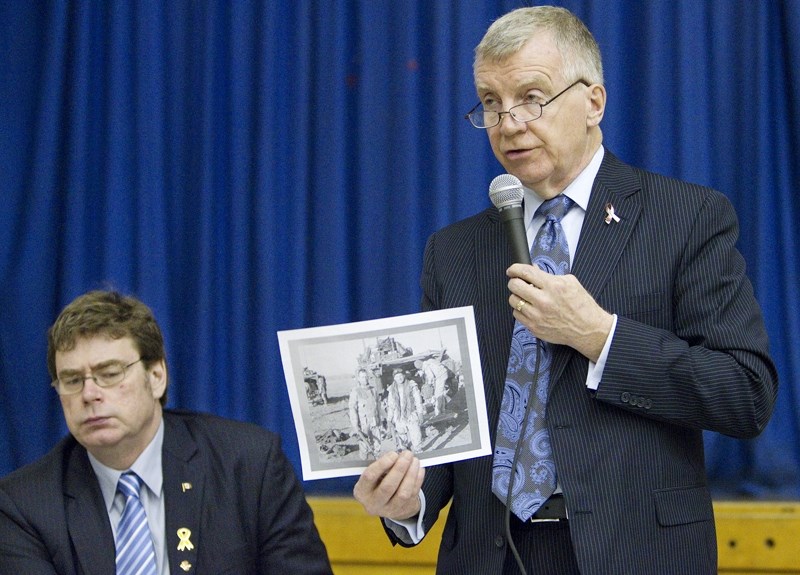Canada is making progress in Afghanistan, says a local member of Parliament, but still has to work on serious problems of corruption before that nation can stand on its own.
About 30 people gathered in the gym of Major-General Griesbach School in Edmonton Tuesday night for a town hall meeting on Canada's future in Afghanistan. The evening was hosted by Edmonton-St. Albert MP Brent Rathgeber.
Canadian troops have been in Afghanistan since 2002, Rathgeber said, and have since made major progress in eradicating polio and building schools in the region.
"However, it has not been without its cost," he said — some 154 Canadian soldiers have died in the process.
The Afghan people are no different from us, and just want to be able to go to school or work without getting shot or blown up said Laurie Hawn, Conservative MP for Edmonton-Centre and parliamentary secretary for the minister of defence.
"Can we turn our backs on those people? For me, the answer is no … Canada has never done that."
Change on the ground
Canada will withdraw its combat troops from Afghanistan starting this July, Hawn said, replacing them with about 950 trainers for local police and soldiers.
"They will be in around Kabul, not necessarily right in Kabul, and it will be very basic military and policy training."
Our troops have been in Afghanistan for almost longer than both World Wars combined, Rathgeber said, and can't stay there forever. "The Afghans have to take control over their own security."
Canada will continue to work there on education and employment issues through NGOs and the Canadian International Development Agency after the troops leave, he added.
Afghanistan isn't as bad as it seems, noted Hawn, who has toured the country many times, but it is still a place of extreme poverty. "They are the worst-off country in the world."
The country now has a working parliament with more female members in it than Canada's, Hawn said, but still struggles with corruption.
"There's no question about it. [President Hamid] Karzai is not the cleanest guy on the block."
Canada has to help train the nation's cops and judges to rein in criminals, Hawn said, particularly those involved in the drug trade. Famers can make thousands of dollars more growing pomegranates than poppies, he noted, but are often forced by insurgents to grow the latter for heroin production.
"Until we get a grip on the justice system in Afghanistan, we won't get a grip on the poppy situation."
Hazy future
Many nations have invaded Afghanistan in the past, said St. Albert resident Pat Collins, and all were eventually booted back out. "Why should we expect a different outcome from all those other invaders?"
Because we were invited, Hawn replied. "We were there at the request of the most legitimate Afghan authority we could find." Canada is also working with the Afghan people and government to help them provide their own security and services when we leave.
Edmonton resident Mally-Anne Warring wondered when Canada's efforts would start to pay off. Canadian soldiers are fighting to defend Afghanistan, she said, yet when its government puts up a major contract to develop its iron and copper deposits, it gives it to the Chinese.
"Is there no way that Afghanistan could somehow pay some gratitude and allow the allies to develop these resources?"
Afghanistan is rich in resources, Hawn said, and the federal committee on Afghanistan is looking for more ways to help develop them.
"At the end of the day, will the cost be worth it?" Hawn said. "I don't know." Croatia was a basket case when Canadian troops entered it in the early 1990s, he noted, but now it's part of the NATO force in Afghanistan. "I know we're guaranteed to fail if we don't try."




